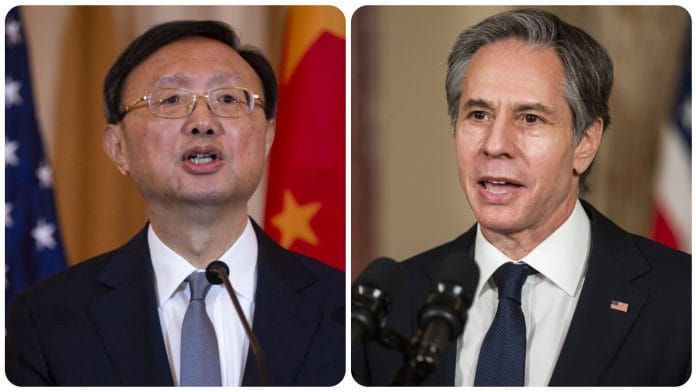Washington: The first high-level talks between the U.S. and China since President Joe Biden took office immediately descended into bickering and recriminations, illustrating the deep divide that remains despite the change in the White House.
Each side sharply criticized the other over human rights, trade and international alliances at the meeting in frozen Anchorage, Alaska. U.S. Secretary of State Antony Blinken vowed to raise concerns about cyber attacks, the treatment of Muslim minorities in Xinjiang and Beijing’s increasing control over Hong Kong.
“The alternative to a rules-based order is a world in which might makes right and winner takes all and that would be a far more violent and unstable world,” Blinken said.
The Chinese fired back. Yang Jiechi, a member of the Politburo, offered a lengthy monologue in which he said Western nations don’t represent global public opinion and called the U.S. the “champion” of cyber-attacks.
“Many people within the United States actually have little confidence in the democracy of the United States,” he said, citing the killing of Black Americans and the Black Lives Matter movement. Near the end of his opening remarks, he said Blinken’s comments weren’t “normal” and added that in response “mine aren’t either.”
Blinken and National Security Advisor Jake Sullivan responded, with Sullivan saying “a confident country is able to look hard at its own shortcomings and constantly seek to improve, and that is the secret sauce of America.”
Asian markets appeared to take the meeting’s acrimonious start in stride. The Shanghai Composite Index fell as much as 1% in early trade while the CSI 300 was down 1.7%, broadly consistent with the global backdrop as worries about technology stocks carried over from U.S. trading.
Chinese diplomats have been signaling for weeks that they would push back hard against any effort by the Biden administration to interfere in issues Beijing considers its own internal affairs, with Yang warning Washington last month not to cross the country’s “red lines.” Blinken had nonetheless pushed the issue during his trip through Asia this week, accusing China of “coercion and aggression.”
Things got worse as the first session continued in Anchorage. Cameras were ushered from the room, only to be called back in. Yang and Foreign Minister Wang Yi followed up with more criticism.
“Is that the way you had hoped to conduct this dialogue?” Yang asked, according to his delegation’s translator. “I think we thought too well of the United States. The United States isn’t qualified to speak to China from a position of strength.”
While the Chinese officials protested that the opening criticism by Blinken and Sullivan was no way to treat guests, a senior U.S. official said afterward that the Chinese were intent on grandstanding and engaging in theatrics over substance. The two sides have so far finished the first of three negotiating sessions scheduled for Thursday and Friday.
The rocky start lowered what had already been a low bar for expectations out of the Alaska meeting, signaling just how difficult it will be for the world’s two biggest economies to repair a deeply damaged relationship. There had been unease about the meeting so early in Biden’s term among some administration officials, and the early response was that it may have been a miscalculation, according to one person familiar.
Also read: How Biden can stand up for Asian Americans as hate crimes, attacks soar in US
‘Fighting over nothing’
“Because the Biden administration hasn’t laid out clear policies yet, they end up fighting over nothing, over posturing,” said Derek Scissors, a China analyst at the conservative American Enterprise Institute. “If it requires months to review and get people in place before making China policy, fine, but then don’t pretend you can have a useful meeting with the Chinese.”
Before the meeting began, officials in Beijing had raised the possibility of a virtual summit between Biden and Chinese President Xi Jinping next month, to coincide with Earth Day and turn attention to one area both sides have said they can reach agreement on: combating climate change. It’s not clear if the rocky start to the Alaska talks will derail that effort.
Some tensions were expected at the Anchorage talks. Two months into office, and despite Biden’s criticism of former President Donald Trump, it appears the new American president is unlikely to make major changes to his predecessor’s hard-line approach to China.
On Saudi Arabia, Biden has held back from sanctioning Crown Prince Mohammed bin Salman even as he went beyond Trump by publicly implicating him in the death of columnist Jamal Khashoggi. Biden is taking up Trump’s push to reinvigorate the Quad alliance of the U.S., Australia, Japan and India. Blinken has praised Trump’s “Abraham Accords,” the rapprochement between Israel and countries in the Middle East.
“At least initially, they’re sticking with what Trump left them,” said Aaron Frieberg, a professor of foreign policy at Princeton University and a national security aide under President George W. Bush. “On concrete things like saying China is committing genocide in Xinjiang — that was a land mine left for them on the way out the door — instead of trying to work around it, they just embraced it.”- Bloomberg
Also read: China’s behaviour inconsistent with world order, say US & Japan. ‘Malicious’, says Beijing







China insulted America & Biden big time while the Eagle looked on!! The Chinese rightly questioned American human rights & it’s democratic credentials!!
I am no Chinese fan but they did show the Americans; especially the so called “liberals” the mirror!! Good job China!!